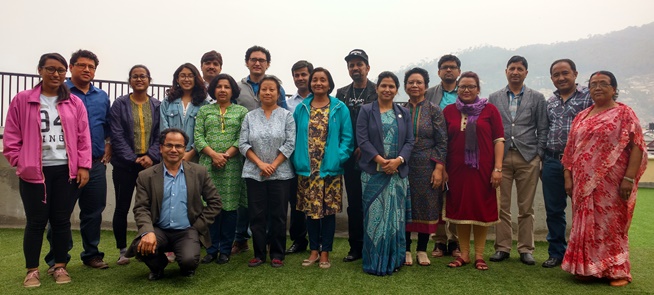
Orientation Program on Gender and Climate Finance

CLIMATE and DEVELOPMENT DIALOGUE
Orientation Program on Gender and Climate Finance
The Gender Action Plan adopted by the United Nations Framework Convention on Climate Change (UNFCCC) in 2017 has laid out 5 priority areas including gender-responsive implementation and means of implementation. Global funds like Green Climate Fund (GCF) have separate gender policies to comply with in making financing decisions of climate change projects and programs. Now, gender is considered an integral part of financing adaptation and mitigation actions.
Against this backdrop, members of Climate and Development (C&D) Dialogue[i] on 26 April 2018 interacted on a range of issues including climate change, climate finance, Green Climate Fund (GCF) mechanism, and environmental justice and women’s rights. The interaction was part of a day-long orientation program organized jointly by Prakriti Resources Centre (PRC), Both Ends and HELVETAS Swiss Inter Cooperation to help the C&D Dialogue members step into the gender and climate finance arena.
Representatives from PRC, the Ministry of Finance (MoF)- National Designated Authority to GCF and the Ministry of Forest and Environment (MoFE) apprised the 21 participants, eleven of them women, of such areas as the state of climate change in Nepal, climate finance and GCF, gender integration in climate change and the NDA’s role.
PRC’s Prabin Man Singh briefed the participants about climate change trend, vulnerabilities and impacts, major policies, programs, and key actors working in climate change in Nepal. He also touched on estimated cost required for adaptation and mitigation actions and the present state of funding in the country. Raju Pandit Chhetri, also from PRC, talked about the existing provisions related to climate finance under UNFCCC and Paris Agreement, Nepal’s effort to access climate funds, GCF’s financial instruments, strategic area results, project approval cycle, and provision of accreditation with GCF. He stressed the need Nepal to strengthen institutional capacity to access and mobilize different funds. MoFE under-secretary Madhu Ghimire informed the participants about the gender mainstreaming in National Adaptation Plan formulation process and gender budget coding in national budget, highlighting the importance of engendering climate finance and climate actions in order to address the disproportionate impacts of climate change on women. MoF under-secretary Shiva Sharma highlighted that CSO participation and, gender and indigenous people’s agenda are key to accessing funds from GCF. MoF is developing a stakeholder engagement strategy for GCF, which, he said, will ensure CSO engagement in identification, development, implementation and monitoring and evaluation of GCF’s projects.
The presentations spurred the participants into raising pertinent questions. They explored ways to strengthen gender focus and CSO contribution in proposals to be submitted to GCF from Nepal. They also delved into how Nepalese CSOs can have a say in design and implementation of GCF projects in Nepal, and play a role in making climate actions and climate finance transparent, accountable and gender responsive; and ways to engage grassroots women’s groups in discussions on these issues.
The discussions helped them come up with some ideas such as soliciting the support of environment and gender experts to understand how best environmental justice and women’s rights can be dovetailed, and producing easy to understand publications to supplement climate finance and gender discussions at the local level.
The program concluded with the C&D Dialogue members exploring three options for their engagement in GCF process. They will try to get accredited with GCF’s accredited entities or they can become executing entities of accredited entities and implement GCF funded projects. Until these options become a reality, they plan to function as a vigilance group tracking and monitoring climate finance.
[i] C&D Dialogue is an informal common platform of non-government stakeholders that facilitates dialogues and exchange of knowledge and learning on climate finance and gender, low carbon development, sources and mechanism of climate finance etc. It also bridges the knowledge gap between the Centre and the grassroots, and generates collective actions for policy influencing.
